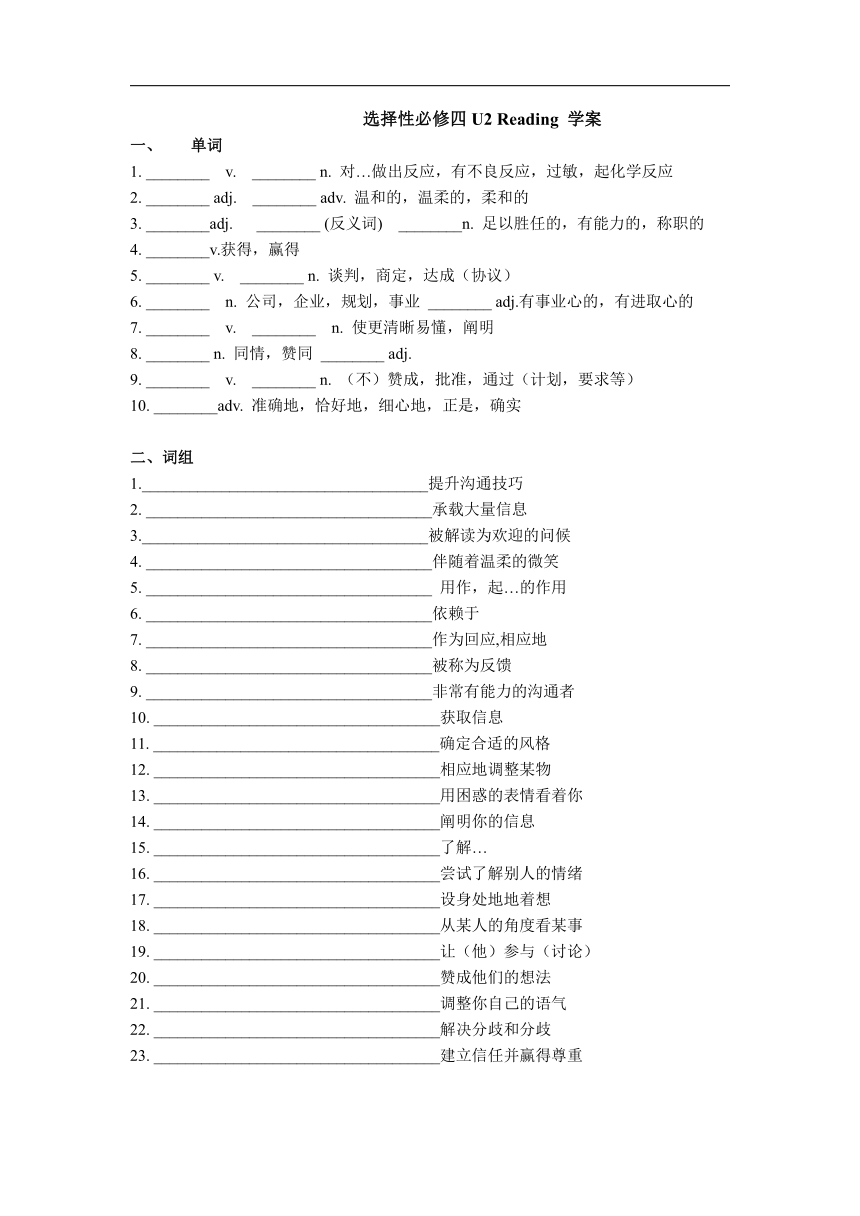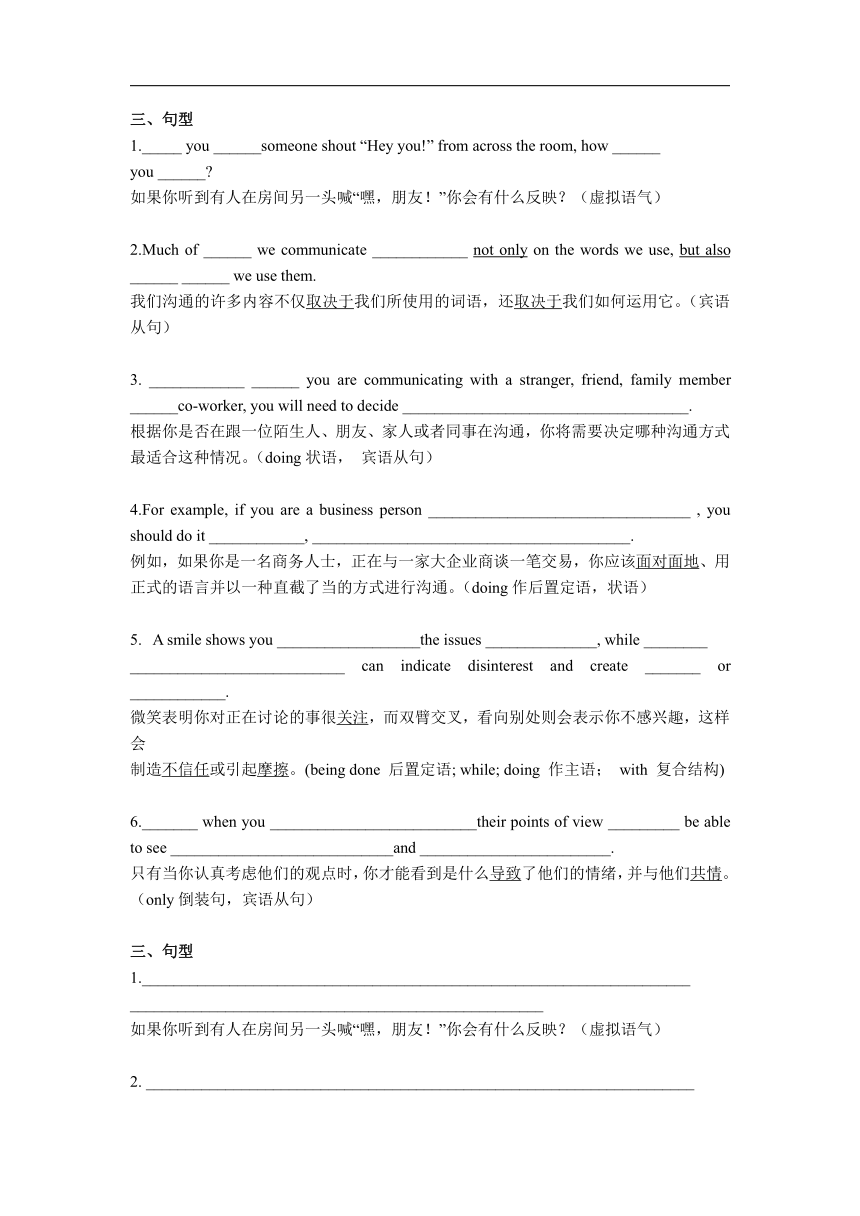译林版(2020)选择性必修第四册Unit 2 Understanding each other Reading 导学案(含答案)
文档属性
| 名称 | 译林版(2020)选择性必修第四册Unit 2 Understanding each other Reading 导学案(含答案) |  | |
| 格式 | docx | ||
| 文件大小 | 23.3KB | ||
| 资源类型 | 教案 | ||
| 版本资源 | 牛津译林版(2019) | ||
| 科目 | 英语 | ||
| 更新时间 | 2024-04-04 10:57:50 | ||
图片预览


文档简介
选择性必修四U2 Reading 学案
单词
1. ________ v. ________ n. 对…做出反应,有不良反应,过敏,起化学反应
2. ________ adj. ________ adv. 温和的,温柔的,柔和的
3. ________adj. ________ (反义词) ________n. 足以胜任的,有能力的,称职的
4. ________v.获得,赢得
5. ________ v. ________ n. 谈判,商定,达成(协议)
6. ________ n. 公司,企业,规划,事业 ________ adj.有事业心的,有进取心的
7. ________ v. ________ n. 使更清晰易懂,阐明
8. ________ n. 同情,赞同 ________ adj.
9. ________ v. ________ n. (不)赞成,批准,通过(计划,要求等)
10. ________adv. 准确地,恰好地,细心地,正是,确实
二、词组
1.____________________________________提升沟通技巧
2. ____________________________________承载大量信息
3.____________________________________被解读为欢迎的问候
4. ____________________________________伴随着温柔的微笑
5. ____________________________________ 用作,起…的作用
6. ____________________________________依赖于
7. ____________________________________作为回应,相应地
8. ____________________________________被称为反馈
9. ____________________________________非常有能力的沟通者
10. ____________________________________获取信息
11. ____________________________________确定合适的风格
12. ____________________________________相应地调整某物
13. ____________________________________用困惑的表情看着你
14. ____________________________________阐明你的信息
15. ____________________________________了解…
16. ____________________________________尝试了解别人的情绪
17. ____________________________________设身处地地着想
18. ____________________________________从某人的角度看某事
19. ____________________________________让(他)参与(讨论)
20. ____________________________________赞成他们的想法
21. ____________________________________调整你自己的语气
22. ____________________________________解决分歧和分歧
23. ____________________________________建立信任并赢得尊重
三、句型
1._____ you ______someone shout “Hey you!” from across the room, how ______
you ______
如果你听到有人在房间另一头喊“嘿,朋友!”你会有什么反映?(虚拟语气)
2.Much of ______ we communicate ____________ not only on the words we use, but also ______ ______ we use them.
我们沟通的许多内容不仅取决于我们所使用的词语,还取决于我们如何运用它。(宾语从句)
3. ____________ ______ you are communicating with a stranger, friend, family member ______co-worker, you will need to decide ____________________________________.
根据你是否在跟一位陌生人、朋友、家人或者同事在沟通,你将需要决定哪种沟通方式最适合这种情况。(doing状语, 宾语从句)
4.For example, if you are a business person _________________________________ , you should do it ____________, ________________________________________.
例如,如果你是一名商务人士,正在与一家大企业商谈一笔交易,你应该面对面地、用正式的语言并以一种直截了当的方式进行沟通。(doing作后置定语,状语)
A smile shows you __________________the issues ______________, while ________
___________________________ can indicate disinterest and create _______ or ____________.
微笑表明你对正在讨论的事很关注,而双臂交叉,看向别处则会表示你不感兴趣,这样会
制造不信任或引起摩擦。(being done 后置定语; while; doing 作主语; with 复合结构)
6._______ when you __________________________their points of view _________ be able to see ____________________________and ________________________.
只有当你认真考虑他们的观点时,你才能看到是什么导致了他们的情绪,并与他们共情。
(only倒装句,宾语从句)
三、句型
1._____________________________________________________________________
____________________________________________________
如果你听到有人在房间另一头喊“嘿,朋友!”你会有什么反映?(虚拟语气)
2. _____________________________________________________________________
____________________________________________________
我们沟通的许多内容不仅取决于我们所使用的词语,还取决于我们如何运用它。(宾语从句)
3. _____________________________________________________________________
____________________________________________________
根据你是否在跟一位陌生人、朋友、家人或者同事在沟通,你将需要决定哪种沟通方式最适合这种情况。(doing状语, 宾语从句)
4. _____________________________________________________________________
____________________________________________________
例如,如果你是一名商务人士,正在与一家大企业商谈一笔交易,你应该面对面地、用正式的语言并以一种直截了当的方式进行沟通。(doing作后置定语,状语)
5. _____________________________________________________________________
_________________________________________________________________________________________________________________________
微笑表明你对正在讨论的事很关注,而双臂交叉,看向别处则会表示你不感兴趣,这样会
制造不信任或引起摩擦。(being done 后置定语; while; doing 作主语; with 复合结构)
6. _____________________________________________________________________
____________________________________________________
只有当你认真考虑他们的观点时,你才能看到是什么导致了他们的情绪,并与他们共情。
(only倒装句,宾语从句)
教师版答案
一、 单词
1.对…做出反应,有不良反应,过敏,起化学反应react v. reaction n.
2.温和的,温柔的,柔和的 gentle adj. gently adv.
3.足以胜任的,有能力的,称职的 competent adj. incompetent (反义词) competence n.
4.获得,赢得obtain
5.谈判,商定,达成(协议)negotiate v. negotiation n.
6.公司,企业,规划,事业enterprise n. enterprising adj.有事业心的,有进取心的
7.使更清晰易懂,阐明clarify v. clarification n.
8.同情,赞同sympathy n. sympathetic adj.
9.(不)赞成,批准,通过(计划,要求等)(dis)approve v. (dis)approval n.
10.准确地,恰好地,细心地,正是,确实precisely
二、词组
1.sharpen(better/ improve / polish up) communication skills提升沟通技巧
2.carry a lot of information承载大量信息
3be interpreted as a welcoming greeting被解读为欢迎的问候
4.be accompanied by a gentle smile伴随着温柔的微笑
5.function as(work as / act as / serve as) 用作,起…的作用
6.be dependent on/ depend on / rely on依赖于
7.in response作为回应
8.be referred to as feedback被称为反馈
9.a highly competent communicator非常有能力的沟通者
10.obtain this information获取信息
11.determine the appropriate style确定合适的风格
12.adjust…accordingly相应地调整某物
13.look at you with a confused expression用困惑的表情看着你
14.clarify your message阐明你的信息
15.be knowledgeable about了解…
16.seek to understand the other person’s emotions尝试了解别人的情绪
17.put yourself in their shoes设身处地地着想
18.from one’s perspective从某人的角度看某事
19.engage him in the discussion让(他)参与(讨论)
20.approve of their ideas赞成他们的想法
21.make adjustments to your own tone调整你自己的语气
22.settle differences and disagreements解决分歧和分歧
23.build trust and gain respect建立信任并赢得尊重
三、句型
1.If you heard someone shout “Hey you!” from across the room, how would
you react
如果你听到有人在房间另一头喊“嘿,朋友!”你会有什么反映?(虚拟语气)
2.Much of what we communicate is dependent on not only on the words we use, but also on how we use them.
我们沟通的许多内容不仅取决于我们所使用的词语,还取决于我们如何运用它。(what/ how宾语从句, be dependent on, not only…but also…)
3.Depending on whether you are communicating with a stranger, friend, family member or co-worker, you will need to decide which communication channel best suits the situation.
根据你是否在跟一位陌生人、朋友、家人或者同事在沟通,你将需要决定哪种沟通方式最适合这种情况。(doing状语,whether… or…; 宾语从句)
4.For example, if you are a business person negotiating with a large enterprise about a deal , you should do it face to face, using formal language in a straightforward manner
例如,如果你是一名商务人士,正在与一家大企业商谈一笔交易,你应该面对面地、用正式的语言并以一种直截了当的方式进行沟通。(doing作后置定语,状语)
5.A smile shows you are attentive to the issues being discussed, while looking away with your arms folded can indicate disinterest and create distrust or friction
微笑表明你对正在讨论的事很关注,而双臂交叉,看向别处则会表示你不感兴趣,这样会
制造不信任或引起摩擦。(being done 后置定语; while; doing 作主语; with 复合结构)
6.Only when you give serious consideration to their points of view will you be able to see
what accounts for their emotions and empathize with them.
只有当你认真考虑他们的观点时,你才能看到是什么导致了他们的情绪,并与他们共情。
(only倒装句)
单词
1. ________ v. ________ n. 对…做出反应,有不良反应,过敏,起化学反应
2. ________ adj. ________ adv. 温和的,温柔的,柔和的
3. ________adj. ________ (反义词) ________n. 足以胜任的,有能力的,称职的
4. ________v.获得,赢得
5. ________ v. ________ n. 谈判,商定,达成(协议)
6. ________ n. 公司,企业,规划,事业 ________ adj.有事业心的,有进取心的
7. ________ v. ________ n. 使更清晰易懂,阐明
8. ________ n. 同情,赞同 ________ adj.
9. ________ v. ________ n. (不)赞成,批准,通过(计划,要求等)
10. ________adv. 准确地,恰好地,细心地,正是,确实
二、词组
1.____________________________________提升沟通技巧
2. ____________________________________承载大量信息
3.____________________________________被解读为欢迎的问候
4. ____________________________________伴随着温柔的微笑
5. ____________________________________ 用作,起…的作用
6. ____________________________________依赖于
7. ____________________________________作为回应,相应地
8. ____________________________________被称为反馈
9. ____________________________________非常有能力的沟通者
10. ____________________________________获取信息
11. ____________________________________确定合适的风格
12. ____________________________________相应地调整某物
13. ____________________________________用困惑的表情看着你
14. ____________________________________阐明你的信息
15. ____________________________________了解…
16. ____________________________________尝试了解别人的情绪
17. ____________________________________设身处地地着想
18. ____________________________________从某人的角度看某事
19. ____________________________________让(他)参与(讨论)
20. ____________________________________赞成他们的想法
21. ____________________________________调整你自己的语气
22. ____________________________________解决分歧和分歧
23. ____________________________________建立信任并赢得尊重
三、句型
1._____ you ______someone shout “Hey you!” from across the room, how ______
you ______
如果你听到有人在房间另一头喊“嘿,朋友!”你会有什么反映?(虚拟语气)
2.Much of ______ we communicate ____________ not only on the words we use, but also ______ ______ we use them.
我们沟通的许多内容不仅取决于我们所使用的词语,还取决于我们如何运用它。(宾语从句)
3. ____________ ______ you are communicating with a stranger, friend, family member ______co-worker, you will need to decide ____________________________________.
根据你是否在跟一位陌生人、朋友、家人或者同事在沟通,你将需要决定哪种沟通方式最适合这种情况。(doing状语, 宾语从句)
4.For example, if you are a business person _________________________________ , you should do it ____________, ________________________________________.
例如,如果你是一名商务人士,正在与一家大企业商谈一笔交易,你应该面对面地、用正式的语言并以一种直截了当的方式进行沟通。(doing作后置定语,状语)
A smile shows you __________________the issues ______________, while ________
___________________________ can indicate disinterest and create _______ or ____________.
微笑表明你对正在讨论的事很关注,而双臂交叉,看向别处则会表示你不感兴趣,这样会
制造不信任或引起摩擦。(being done 后置定语; while; doing 作主语; with 复合结构)
6._______ when you __________________________their points of view _________ be able to see ____________________________and ________________________.
只有当你认真考虑他们的观点时,你才能看到是什么导致了他们的情绪,并与他们共情。
(only倒装句,宾语从句)
三、句型
1._____________________________________________________________________
____________________________________________________
如果你听到有人在房间另一头喊“嘿,朋友!”你会有什么反映?(虚拟语气)
2. _____________________________________________________________________
____________________________________________________
我们沟通的许多内容不仅取决于我们所使用的词语,还取决于我们如何运用它。(宾语从句)
3. _____________________________________________________________________
____________________________________________________
根据你是否在跟一位陌生人、朋友、家人或者同事在沟通,你将需要决定哪种沟通方式最适合这种情况。(doing状语, 宾语从句)
4. _____________________________________________________________________
____________________________________________________
例如,如果你是一名商务人士,正在与一家大企业商谈一笔交易,你应该面对面地、用正式的语言并以一种直截了当的方式进行沟通。(doing作后置定语,状语)
5. _____________________________________________________________________
_________________________________________________________________________________________________________________________
微笑表明你对正在讨论的事很关注,而双臂交叉,看向别处则会表示你不感兴趣,这样会
制造不信任或引起摩擦。(being done 后置定语; while; doing 作主语; with 复合结构)
6. _____________________________________________________________________
____________________________________________________
只有当你认真考虑他们的观点时,你才能看到是什么导致了他们的情绪,并与他们共情。
(only倒装句,宾语从句)
教师版答案
一、 单词
1.对…做出反应,有不良反应,过敏,起化学反应react v. reaction n.
2.温和的,温柔的,柔和的 gentle adj. gently adv.
3.足以胜任的,有能力的,称职的 competent adj. incompetent (反义词) competence n.
4.获得,赢得obtain
5.谈判,商定,达成(协议)negotiate v. negotiation n.
6.公司,企业,规划,事业enterprise n. enterprising adj.有事业心的,有进取心的
7.使更清晰易懂,阐明clarify v. clarification n.
8.同情,赞同sympathy n. sympathetic adj.
9.(不)赞成,批准,通过(计划,要求等)(dis)approve v. (dis)approval n.
10.准确地,恰好地,细心地,正是,确实precisely
二、词组
1.sharpen(better/ improve / polish up) communication skills提升沟通技巧
2.carry a lot of information承载大量信息
3be interpreted as a welcoming greeting被解读为欢迎的问候
4.be accompanied by a gentle smile伴随着温柔的微笑
5.function as(work as / act as / serve as) 用作,起…的作用
6.be dependent on/ depend on / rely on依赖于
7.in response作为回应
8.be referred to as feedback被称为反馈
9.a highly competent communicator非常有能力的沟通者
10.obtain this information获取信息
11.determine the appropriate style确定合适的风格
12.adjust…accordingly相应地调整某物
13.look at you with a confused expression用困惑的表情看着你
14.clarify your message阐明你的信息
15.be knowledgeable about了解…
16.seek to understand the other person’s emotions尝试了解别人的情绪
17.put yourself in their shoes设身处地地着想
18.from one’s perspective从某人的角度看某事
19.engage him in the discussion让(他)参与(讨论)
20.approve of their ideas赞成他们的想法
21.make adjustments to your own tone调整你自己的语气
22.settle differences and disagreements解决分歧和分歧
23.build trust and gain respect建立信任并赢得尊重
三、句型
1.If you heard someone shout “Hey you!” from across the room, how would
you react
如果你听到有人在房间另一头喊“嘿,朋友!”你会有什么反映?(虚拟语气)
2.Much of what we communicate is dependent on not only on the words we use, but also on how we use them.
我们沟通的许多内容不仅取决于我们所使用的词语,还取决于我们如何运用它。(what/ how宾语从句, be dependent on, not only…but also…)
3.Depending on whether you are communicating with a stranger, friend, family member or co-worker, you will need to decide which communication channel best suits the situation.
根据你是否在跟一位陌生人、朋友、家人或者同事在沟通,你将需要决定哪种沟通方式最适合这种情况。(doing状语,whether… or…; 宾语从句)
4.For example, if you are a business person negotiating with a large enterprise about a deal , you should do it face to face, using formal language in a straightforward manner
例如,如果你是一名商务人士,正在与一家大企业商谈一笔交易,你应该面对面地、用正式的语言并以一种直截了当的方式进行沟通。(doing作后置定语,状语)
5.A smile shows you are attentive to the issues being discussed, while looking away with your arms folded can indicate disinterest and create distrust or friction
微笑表明你对正在讨论的事很关注,而双臂交叉,看向别处则会表示你不感兴趣,这样会
制造不信任或引起摩擦。(being done 后置定语; while; doing 作主语; with 复合结构)
6.Only when you give serious consideration to their points of view will you be able to see
what accounts for their emotions and empathize with them.
只有当你认真考虑他们的观点时,你才能看到是什么导致了他们的情绪,并与他们共情。
(only倒装句)
同课章节目录
